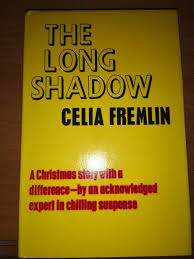Celia Fremlin's crime writing career began brilliantly, with an Edgar-winning debut, maintained a high level for a considerable stretch, and then rather faded out. To some extent, the same can be said of her novel The Long Shadow, which dates from 1975. As ever with Fremlin, it's very readable, but my main reservation was that the resolution of the story wasn't up to the standard of the beginning.
And that beginning really is good. We're introduced to Imogen Barnicott, the third wife of a leading academic who has recently died. He was widely admired, and many people console Imogen. But a number of witty lines - 'How Ivor would have loved being dead!' - suggest that all is not quite as it seems, and the first chapter ends with her murmuring to herself: 'Please God, don't let me ever forget what a bastard he could be.'
My first doubts about the story emerged when a man she meets claims that she killed Ivor. This is absolutely untrue, but when the man tries to blackmail her, her response is passive rather than active and this bothered me. She simply dismisses him as 'a nut'. No matter, the story continues to be entertaining. But Imogen's passivity did begin to grate when she allows a variety of people - including one of Ivor's other exes - to come to stay with her indefinitely.
The later stages of the book also left me somewhat dissatisfied, mainly because of the part played in events by two people who have not emerged very clearly in the preceding narrative. I suspect that Fremlin came up with an intriguing character-based situation (she experienced widowhood herself) but struggled to develop the plot. As a result, this is a book that offers plenty of pleasures, but is not quite up to her highest standard.

I read this recently and also thought Imogen was too much of a doormat. But I suppose a more assertive person wouldn't put up with Ivor for long. I thought the ending was a letdown, but I did love the last line.
ReplyDelete